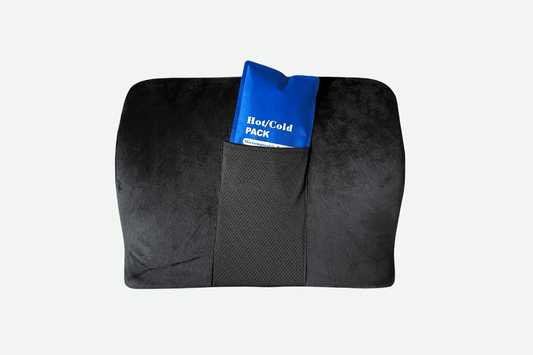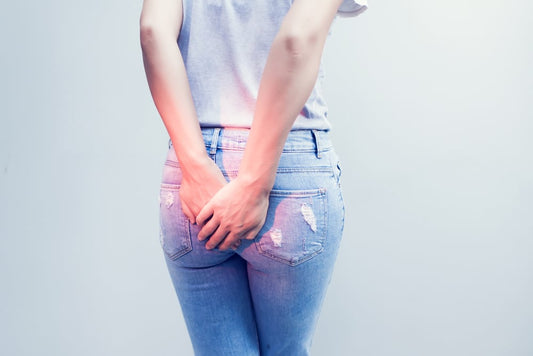How to Heal a Fissure Fast | Doctor Butler's
Robert Cutler, D.O., FAOCPrShare
What Are Fissures?
Anal fissures are small tears or cuts in the skin of the anal canal. Though they may seem minor, they can cause significant pain and discomfort during and after bowel movements. You may also notice bright red blood on toilet paper or in the stool. These tears are most commonly caused by constipation and straining, but they can also result from chronic diarrhea, childbirth, or conditions like Crohn’s disease.
At Doctor Butler’s, we’ve found that fissure cases are accompanied by internal (and possibly external) hemorrhoids about 95% of the time, meaning fissures are a common complication of a worsening hemorrhoid problem in many people. In other words, if you have a fissure, you probably have internal hemorrhoids too. A crucial step in solving that hemorrhoid problem is to treat the fissure.
Fissures and hemorrhoids share many common symptoms such as pain, itching and burning, though a fissure will be marked by more severe, lingering pain and bleeding after a stool passes. Here's a quick table to tell the difference:
|
Hemorrhoid symptoms |
Fissure symptoms |
|
|
Fissures are typically classified as either acute (lasting less than six weeks) or chronic (lasting longer). While most acute fissures heal with at-home treatment, some chronic fissures may require further medical intervention.
There's a few things you should do to treat a fissure, so learn more below.
How to Treat a Fissure Fast at Home (Without Surgery)
The good news is that many fissures can heal naturally with simple changes to your routine. The goal is to relieve pressure, reduce pain, and promote healing without aggravating the tear further.
1. Warm Sitz Baths
A sitz bath involves soaking your lower body in warm water for 10 to 20 minutes, two to three times per day. This practice helps relax the anal muscles, improve blood flow, and ease pain. It’s especially beneficial after a bowel movement, as it can soothe irritation and reduce inflammation. Sitz baths can be done using a shallow tub or a special basin that fits over your toilet.
2. Over-the-Counter Solutions
There are several non-prescription creams and ointments available that can offer relief from fissure-related pain, itching, or burning. Look for topical products with ingredients like Lidocaine, which numbs the area, or Hydrocortisone, which reduces inflammation. A helpful addition to these ingredients is a Protectant like Glycerin, which can make daily activities and bathroom visits more bearable while your body heals. In fact, we developed our Advanced Formula hemorrhoid & fissure ointment with an especially potent mix of protectants for those specifically treating fissures.
3. Fiber-Rich Diet
A key part of fissure treatment is preventing constipation. Increasing your dietary fiber helps soften stool and encourages regular bowel movements, reducing the chance of further tearing. Try to consume 25 to 35 grams of fiber per day from whole food sources like beans, leafy greens, whole grains, apples, pears, and chia seeds. Learn more about sending fiber where it counts.
If getting enough fiber through food is difficult, consider using a gentle fiber supplement like psyllium husk.
4. Hydration
Drinking enough water is crucial for maintaining soft stools and avoiding constipation. Aim for at least eight 8-ounce glasses of water per day. Hydration supports healthy digestion and complements the effects of a high-fiber diet.
5. Foods to Avoid
Certain foods can make bowel movements harder or more painful, slowing the healing process. Try to avoid:
- Processed or low-fiber foods
- Caffeinated drinks that can cause dehydration
- Alcohol, which may irritate the digestive system
- Spicy or acidic foods that worsen discomfort
When Is Medical Intervention for Fissures Needed?
While many fissures improve with conservative care, you should speak to a healthcare provider if:
- The pain is severe or getting worse
- You see blood with every bowel movement
- Symptoms last longer than six weeks
- Over-the-counter treatments haven’t helped
A doctor may recommend prescription ointments like nitroglycerin or nifedipine, which help relax the anal sphincter and increase blood flow to the area. For chronic or deep fissures, other options include Botox injections or a surgical procedure called lateral internal sphincterotomy, which reduces muscle tension and allows healing.
Prompt treatment is key to preventing chronic fissures from forming scar tissue that makes healing more difficult.
Preventative Measures
Once a fissure heals, the goal is to prevent it from returning. Many of the same steps used for treatment apply to prevention:
- Keep your diet rich in fiber
- Stay hydrated throughout the day
- Avoid straining or sitting on the toilet too long
- Get regular exercise to support digestion
- Don’t ignore the urge to go—a delayed bowel movement can become harder and more painful
Consistency is essential. Making these habits part of your daily routine can significantly lower your risk of recurrence.


